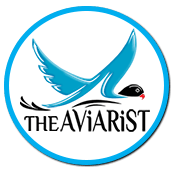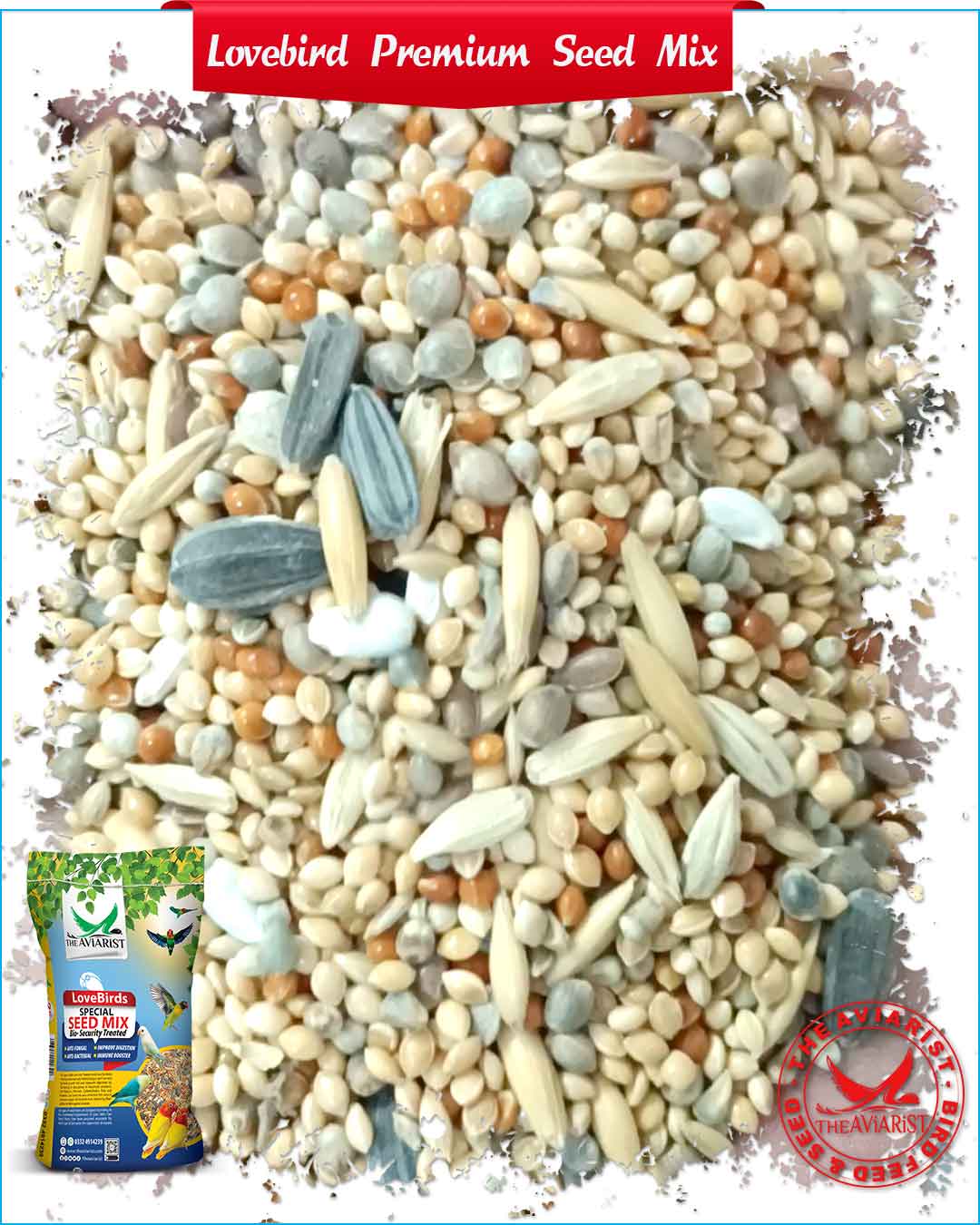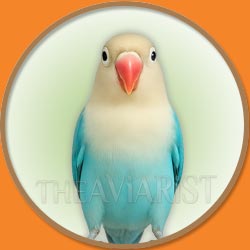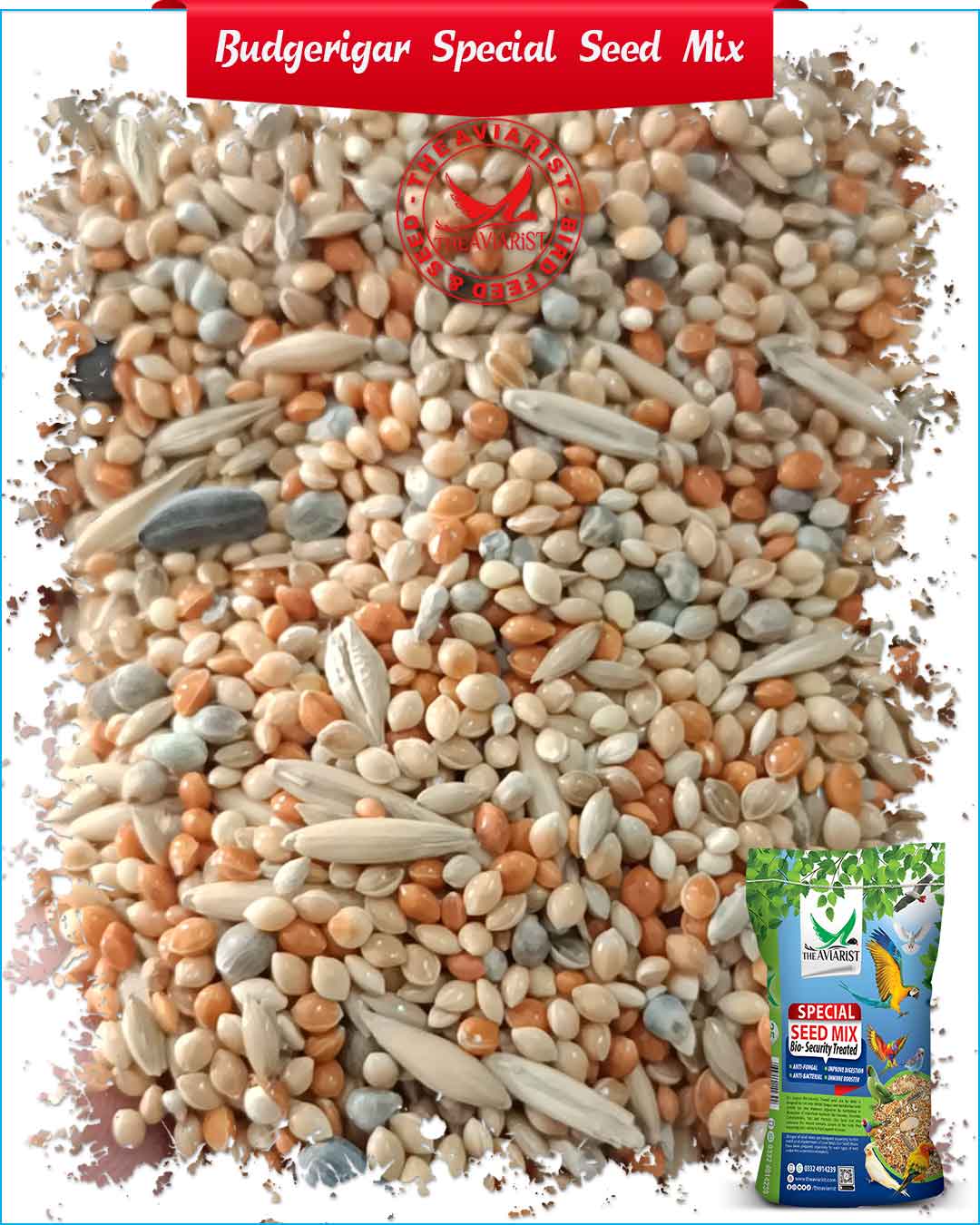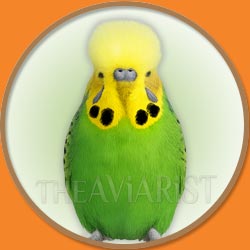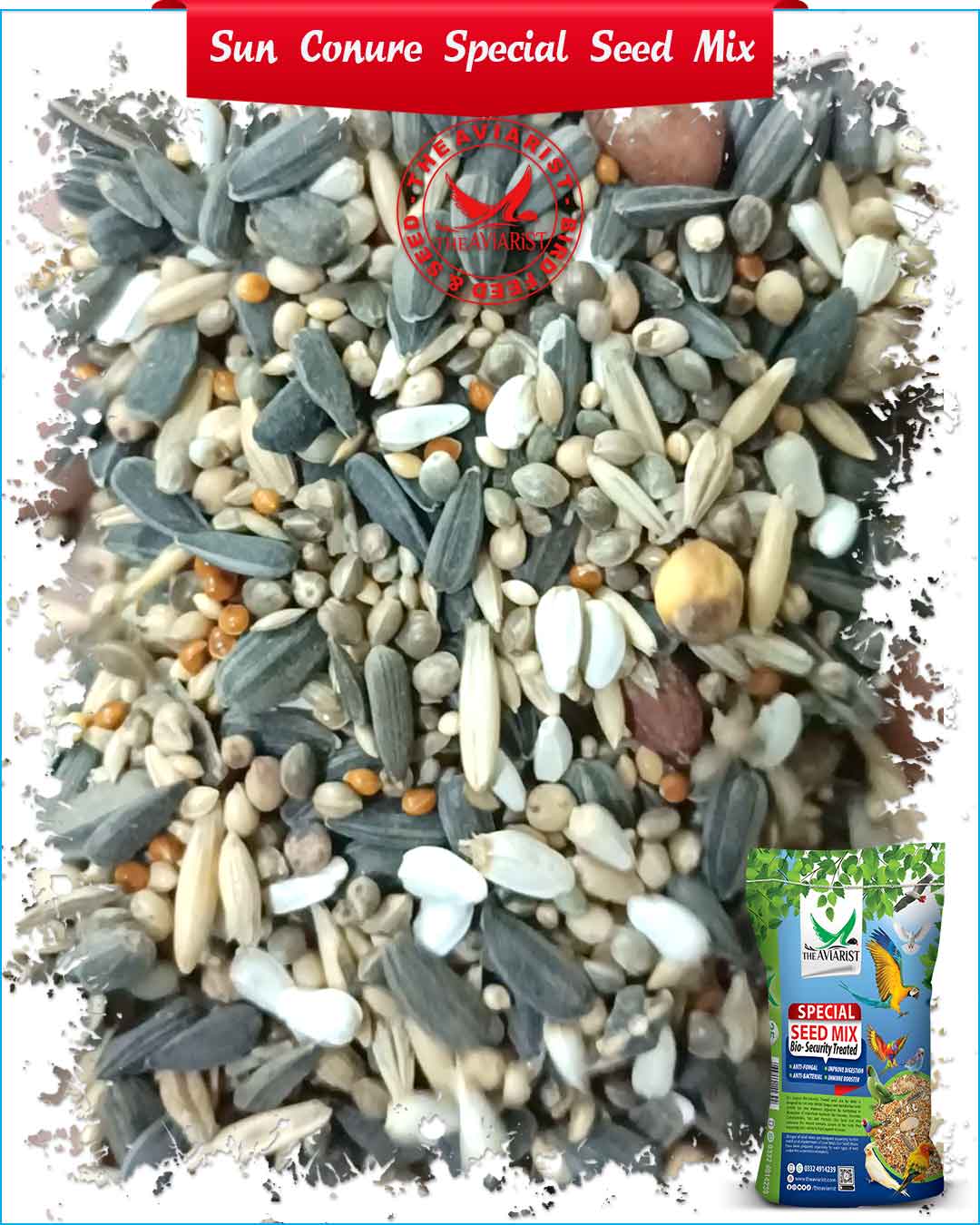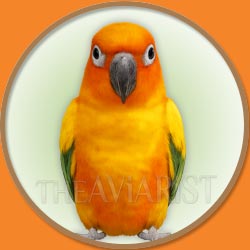Finches

Finches are small, active, and social birds admired for their lively personalities and cheerful songs. Belonging to a wide variety of species, they are known for their vibrant colors, playful behavior, and delicate nature. Finches thrive in groups and require a balanced, hygienic, and nutrient-rich diet to maintain their energy, health, and breeding potential. Providing them with the right seed mix is essential to support their fast metabolism, strong immunity, and overall well-being.
A Complete Nutrition
We understand that Finches are require specialized nutrition to maintain their health, energy, and breeding potential. That’s why we have carefully formulated our Seed Mix for Finches, designed not only to provide balanced nutrition but also to ensure complete feed safety through our advanced bio-security treatment process.
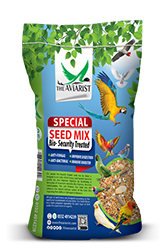
Special Seed Mix
Unlike ordinary seed mixes, our formula goes beyond just filling the seed cup. Every batch is carefully treated and enhanced to support the overall well-being, breeding performance, and immunity of your Finches.
The Special Seed Mix is our core variant, trusted by many breeders. What makes it unique is that, it is regularly adjusted and upgraded according to seasonal changes and breeding requirements.
Tailored nutrition for breeder pairs
Adjusted fat and protein ratios for better breeding outcomes
Ensures strong fertility, better hatch rates, and healthier chicks
This mix is especially beneficial during pre-breeding and general breeding periods.


Key Ingredients:
| Ingredient | اجزاء |
| PROSO MILLET | سفید چینا |
| RED PROSO MILLET | لال چینا |
| CANARI SEED | کنیری |
| WHITE MILLET | دیسی کنگنی |
| RED MILLET | لال کنگنی |
| MUSTARD SEED | سرسوں |
Price Rs.240/Kg
Available in 10Kg & 25Kg Packing
Key Features
1. Bio-Security Treated Seeds
Every seed in our mix undergoes a strict bio-security process. This includes anti-fungal treatment that prevents the growth of harmful fungi such as Aspergillus, which can cause serious respiratory infections in birds. Additionally, the mix is treated to eliminate bad bacteria that often grow in untreated seeds and may lead to digestive or immune-related health problems.
2. Enhanced Digestion
Birds have a delicate digestive system that can sometimes struggle with raw seeds when kept in controled environment. To address this, our seed mix is enriched with special enzymes that aid in the breakdown and absorption of nutrients. These enzymes improve gut health, reduce digestive stress, and maximize nutrient utilization, ensuring that birds get the most from every seed they consume.
3. Immunity-Boosting Formula
A strong immune system is essential for protecting birds against common infections. Our blend is fortified with immunity-enhancing agents that help strengthen their natural defenses. This means your birds are better equipped to fight off seasonal illnesses, bacterial challenges, and environmental stressors.
4. Species-Specific Nutrition
Unlike generic bird seed blends, The Aviarist seed mix is specially crafted for species specific, keeping their natural habitat and dietary patterns in mind. The selected seeds provide the right balance of proteins, healthy fats, vitamins, and minerals that match their natural dietary needs.
Benefits
Healthier Plumage & Brighter Colors
Proper nutrition enhances feather quality, resulting in shinier, stronger, and more vibrant plumage—a sign of a healthy bird.
Boosted Energy & Vitality
With a balanced nutritional profile, birds remain more active, playful, and energetic, reflecting their natural behavior.
Stronger Immunity Against Diseases
The immunity boosting shield protect birds from bacterial and viral threats.
Improved Digestion & Nutrient Absorption
The added enzymes prevent bloating, indigestion, and seed waste, ensuring maximum nutritional benefit.
Longevity & Quality of Life
A safe and nutrient-rich diet contributes to a longer, healthier, and happier life for birds.
Breeding Benefits
Bird breeding requires an optimal diet rich in energy, proteins, and essential micronutrients. The Aviarist Seed Mix is designed to support the breeding cycle in several ways:
Enhanced Fertility in Pairs
Nutrient-rich seeds, combined with immune-boosting agents, improve fertility rates and increase the chances of successful breeding.
Stronger Egg Production
The bio-secure and enzyme-treated formula ensures the hen’s body efficiently absorbs calcium and proteins, leading to stronger, healthier eggs with better hatchability.
Healthy Chick Growth
Parents fed on this seed mix pass on enhanced nutrition to their chicks, ensuring stronger immunity, better feather growth, and healthy development from the very first days.
Reduced Breeding Stress
With improved digestion and higher energy reserves, breeding pairs remain less stressed during mating and chick-rearing, resulting in more consistent breeding success.
Finches
Colorful, Social, and Delightful Aviary Birds
Finches are among the most cherished small birds in aviculture, admired for their vibrant plumage, cheerful songs, and lively social behavior . With over 230 species spread across the world, finches have captivated bird enthusiasts, breeders, and pet owners for centuries. Their manageable size, low maintenance needs, and fascinating diversity make them one of the most popular aviary birds today.
Belonging primarily to the family Estrildidae and Fringillidae , finches are small passerine birds known for their conical beaks, seed-based diets, and flocking nature . They are native to a wide range of habitats, from the open grasslands of Australia to the tropical forests of Asia and Africa. Finches are highly adaptable, thriving in both wild and captive environments, which contributes to their popularity among bird keepers.
Behavior and Characteristics
Finches are social birds that thrive in flocks, often displaying playful and active behavior. Unlike parrots, finches are not hand-tamed or trained to mimic speech, but their chirps, songs, and interactions bring life to any aviary. They are highly energetic and spend much of their time hopping, flying, and foraging.
Their small size makes them ideal for aviary setups, and they flourish when housed in groups rather than individually, as isolation can lead to stress and reduced vitality.
Popular Species of Finches
While there are many species of finches worldwide, some have gained more prominence in aviculture due to their beauty, hardiness, and ease of breeding.
- Zebra Finch (Taeniopygia guttata) – One of the most widely kept finches, known for its striking orange beak, zebra-like chest markings, and cheerful chirping.
- Gouldian Finch (Erythrura gouldiae) – Famous for its breathtaking colors, often called the “rainbow finch,” and prized among breeders and collectors.
- Diamond Firetail (Stagonopleura guttata) - This is a small finch, with striking, spotty plumage. The belly and throat are white with a complete black band. The flanks are black with distinctive white spots. The rump is bright red and the tip of the tail is black
- Owl Finch (Stizoptera bichenovii) - It has a white face bordered with black, brown upperparts and throat, and white underparts. The throat and underparts are separated by another black line. The wings are patterned in brown and white.
- long-tailed finch (Poephila acuticauda) - It has a prominent roundish black bib on its throat and upper chest and a long pointed black tail.
- Society Finch (Lonchura striata domestica) – A domesticated variety, popular for its friendly disposition and ability to foster eggs of other finch species.
Care and Diet
Finches are small, active, and social birds that thrive when provided with proper care, a stress-free environment, and a balanced diet. Unlike parrots, they are not typically hand-tamed but instead bring joy through their chirping, flocking behavior, and vibrant colors. To keep finches healthy and lively, attention must be given to their housing, hygiene, nutrition, and breeding support.
Housing & Environment
- Space: Finches are strong fliers and need a spacious cage or aviary that allows horizontal flight. A longer cage is preferred over a tall one.
- Perches: Provide multiple natural wooden perches of different sizes to exercise their feet and prevent sores.
- Companionship: As flock birds, finches should be kept in pairs or groups. Keeping a single finch often leads to stress and reduced activity.
- Safety: Place cages in a well-lit area, away from direct drafts, excessive noise, and predators like cats.
Diet & Nutrition
Finches require a diet that supports their fast metabolism and high energy needs. A high-quality seed mix is the foundation of their diet, ideally containing different millets, canary seed, mustard seed & flas seeds.
Supplements & Additions
- Fresh Greens: Spinach, kale, lettuce, and chickweed add essential vitamins.
- Fruits: All seasonal fruites in small amounts (avoid avocado, as it is toxic).
- Egg Food & Soft Foods: Especially important during breeding and chick-rearing.
- Cuttlebone/Mineral Block: Ensures calcium intake for strong bones and healthy eggshells.
Providing a bio-security treated seed mix, like the one offered by The Aviarist, ensures safety from fungi, bacteria, and spoilage, making it healthier and longer-lasting.
Breeding Care
Finches are excellent breeders, making them a favorite among aviculturists. With the right environment, a healthy diet, and proper nesting material, most finches breed readily in captivity.
- Nesting: Provide nesting materials such as coconut fiber or grass, and small nest boxes.
- Diet During Breeding: Increase protein intake with egg food, soft foods, and sprouted seeds.
- Clutch Size: Usually 4–6 eggs.
- Incubation: Around 12–14 days, with both parents sharing duties.
- Chick Care: Parents feed chicks regurgitated seeds and soft food until they are weaned at 4–6 weeks.
- Calcium Support: Essential for females during egg-laying to prevent egg-binding.
Feeding a nutrient-rich diet enhances fertility, ensures strong eggshells, and improves chick survival rates—crucial for both hobby and commercial breeders.
Finches in Aviculture
Caring for finches requires attention to their housing, hygiene, and diet. With a clean environment, safe companionship, and a nutritionally balanced seed mix, finches reward their keepers with cheerful songs, brilliant colors, and even successful breeding. At The Aviarist, our Premium Seed Mix for Finches is specially formulated to support their health, enhance immunity, and promote strong breeding results, making it the ideal choice for both hobbyists and commercial breeders.
Commercial Aspect of Finch Breeding
Finch breeding holds a significant commercial value worldwide due to the high demand for these small, colorful, and melodious birds. Popular species like Zebra Finches, Gouldian Finches, and Society Finches are widely bred not only for the pet trade but also for aviary exhibitions and ornamental purposes. Their relatively low maintenance, rapid breeding cycles, and ability to adapt well in captivity make them an attractive choice for aviculturists and hobby breeders looking for profitable ventures. A strong market exists for well-bred, healthy finches, especially when raised on premium diets like The Aviarist’s Seed Mix, which enhances fertility, chick survival rates, and feather quality—key traits valued in the commercial trade.
Why Finches Are Popular Pet Birds
- Low Maintenance – Require smaller enclosures compared to parrots.
- Social and Entertaining – Their chirps, flights, and flocking behavior bring joy to aviaries.
- Wide Variety – Finches come in numerous colors and patterns, appealing to collectors.
- Breeding Potential – Ideal for beginners and commercial breeders alike.
Nutritional Requirements of Finches
Macronutrient
Protein
Protein is essential for muscle maintenance, feather growth, fertility, and chick development.
- Maintenance: 12–14% of diet.
- Breeding/Chick rearing: 15–18%.
- Molting: 14–16%.
Fats
Provide energy and maintain glossy plumage, but should be controlled to avoid obesity.
- Ideal range: 4–6% of diet. Excess oily seeds should be limited.
Carbohydrates & Fiber
Main source of energy for finches’ active lifestyle and supports digestive health.
- Requirement: 60–65% of diet, mostly from small grains and millets.
Vitamins
- Vitamin A: Critical for immune function, vision, and feather health.
- Vitamin D3: Essential for calcium absorption and strong eggshells.
- Vitamin E: Boosts fertility and reproductive performance.
- Vitamin K: Important for blood clotting and bone health.
- B-Complex Vitamins: Aid in metabolism, nervous system health, and feather quality.
Minerals
- Calcium: 0.8–1% of diet. Vital for egg-laying females to prevent egg binding and weak eggshells. (Provide cuttlebone, mineral blocks, or crushed oyster shell).
- Phosphorus: Must be balanced with calcium in a 2:1 ratio for proper absorption.
- Trace Minerals: Small amounts of iron, zinc, iodine, magnesium, and selenium are essential for overall health. (Best provided through mineral blocks and a varied diet).
Water
Fresh, clean water should always be available. Even mild dehydration reduces breeding performance and affects feather quality.
Breeding Season Adjustments
During the breeding season, finches have higher nutritional demands to support fertility, egg production, and chick rearing. Their diet should be adjusted carefully to provide extra protein, energy, and minerals:
- Protein: Increase to 15–18% of the diet to support egg development, fertility, and chick growth. Egg food, sprouted seeds, and soaked legumes are excellent protein boosters.
- Fats: Maintain around 5–6%, ensuring enough energy for breeding pairs without causing obesity. Supplement with small amounts of niger or flax seeds.
- Calcium & Minerals: Essential for strong eggshells and preventing egg binding in females. Provide cuttlebone, mineral blocks, or crushed oyster shell.
- Vitamin D3: Ensure exposure to natural sunlight or provide supplements to help with calcium absorption.
- Vitamin E: Increase slightly through diet (wheat germ oil or supplements) to support fertility and reproductive health.
Providing a nutritionally rich seed mix, along with soft foods and mineral support, ensures stronger eggs, higher hatch rates, and healthier chicks.
Why The Aviarist Seed Mix?
Caring for finches requires attention to their housing, hygiene, and diet. With a clean environment, safe companionship, and a nutritionally balanced seed mix, finches reward their keepers with cheerful songs, brilliant colors, and even successful breeding. At The Aviarist, our Premium Seed Mix for Finches is specially formulated to support their health, enhance immunity, and promote strong breeding results, making it the ideal choice for both hobbyists and commercial breeders.
Fuel their songs, colors, and vitality with The Aviarist Special Seed Mix for Finches—safe, nutritious, and specially crafted for all finch varieties.
